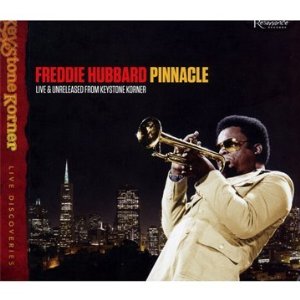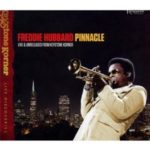
Resonance
When Freddie Hubbard died at the end of 2008 he had enjoyed one of the best jazz careers of his time, but clouds shadowed his achievements. He didn’t always make full use of his talents, his personal demons sometimes influenced his behavior and there was always a more newsworthy trumpeter on the scene. And perhaps cruelest of all, he overextended himself on his challenging instrument and spent many of his last years unable to play.
Still, Pinnacle reminds us of what Hubbard accomplished. He had superlative chops and could navigate all sorts of thorny chord changes, but could also put it together into music with a sense of melody and communication. That comes across on these live recordings from 1980, which touch on both bop and the funk-oriented music that still had the chance of giving improvising players a hit in those days. Some of the licks are familiar, but Hubbard puts together a solo with drive and character on each cut.
Drawn from a trove of tapes recorded at the Keystone Korner club in San Francisco, Pinnacle also demonstrates how the boundary line between official and bootleg releases continues to get thinner and thinner. At times the limitations of what sound like 1980 cassette tapes come through. Fortunately, the limits aren’t tight enough to stifle Hubbard’s trumpet, and the veritè recordings also give a true sense of live jazz, with bits of audience rowdiness or cues and exhortations from Hubbard enlivening the mix now and then. Hubbard’s band (including notables such as keyboardist Billy Childs and bassist Larry Klein) are skilled students of their 60’s forebears, and saxophonist Hadley Caliman evokes ghosts of Coltrane on the concluding “Giant Steps.”
Pinnacle won’t displace Hubbard’s Blue Note classics or the best of his CTI work, but it is a valuable document of a career in improvised music.



No Comments comments associated with this post